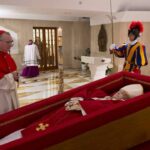TEENAGER DIES OF STROKE WHILE MAKING SANDWICHES AT HOME
Published on December 9, 2019 at 1:21 PM by FACE OF MALAWI
A 17 year old teenager has died of a stroke after he collapsed at home while making tea for his family.
Army cadet Ben little wood did not drink or smoke but is feared to have turned his head quickly causing an artery to tear and sending a blood clot to his brain.
The youngster was found suffering a fatal seizure on the kitchen floor by his mother when he failed to answer her calls and he died in hospital eight days later.
Due to his young age doctors didn’t initially realise Mr little wood had suffered a stroke until four days after he was admitted to the intensive care unit.
One senior medic who carried out a brain scan on the teenager later said he had not come across a case in 12 years of treating patients.
At an inquest in Stockport Greater Manchester, Mr Little wood’s mother called for greater awareness and research into the cause of strokes. The average age of people in England who have a stroke for the first time is 68.
Mr Littlewood, from Dukinfield, had been studying joinery and carpentry and was a lance corporal in the army cadets, with hopes of joining the Territorial Army after qualifying at college.
His mother Vicki Brocklehurst, a nursery worker, told the hearing: “He was a character – a little clumsy, but he had the biggest heart and helped anybody. He was the best big brother, cousin, grandson and nephew. He lived at home with me, stepdad and sister and she turned three the day after Ben passed.
“His tutor told him he was one of the best students he had had and he loved college. There were no health problems and no concerns about drugs or alcohol.”
The tragedy occurred on 3 April after the family were recovering from colds and coughs.
Mrs Brocklehurst said: “He had been out walking with the dog and seemed much better in himself, bright and alert. Ben had been to college then came home and had the children for a couple of hours while I have gone to work.
“He would normally just lark about whilst I wasn’t there, have some tea and take a lot of selfies and mess about. I had a missed call from him which I saw when I came to check my phone at 5pm. I tried calling him back but never got a response.
“Normally he would call back and at least answer but it must have been about 20 minutes and I said to my colleagues: ‘I’m going to have to go home – something’s not quite right.’ I just had the feeling. The time I got home was approximately 6.10pm and I just remember walking in the house and the dog ran to get me and then ran straight back to the kitchen where Ben was.
“He was lying on the kitchen floor, fitting at the time and the dog bowl had been upturned and there were biscuits on the floor. I thought maybe he had fallen over the bowl and fallen and hit his head.
My daughter had been sat in the kitchen counter and there are signs to suggest Ben had been preparing tea and made his sister a crisp butty and himself a bacon butty which was half eaten.
“I summoned the ambulance and immediately paramedics came and noted a bump and cut on his forehead. Staff at the hospital and nurses especially were fantastic.”
Mr Little wood underwent a CT scan at Tameside Hospital but tests showed his brain was normal. He underwent another scan on April 7 when doctors realized he had suffered an Ischaemic stroke.
Dr Shiva Koteeswaran, a consultant radiologist who carried out the initial CT scan at Tameside Hospital, said: “I looked at the brain itself and it looked completely normal.
But discrepancies and misrepresentations in scans can be as high as 20 per cent. My experience with Basilar Artery thrombosis is very rare and I have not diagnosed it in my 12 years.
“At that time I didn’t think it was significant but three months later I was informed there was a discrepancy. Even looking back if I was looking back and knowing the outcome I could immediately see where the brain was. I only wish I could turn back the clock and go back.
“I still wouldn’t be able to say looking at the scan that the outcome is Basilar Artery Thrombosis and go treat it.”
Dr Christopher Douglass, a consultant neurologist at Salford Royal Hospital, said: “It’s important to say nobody suspected a stroke and I have to say these kind of strokes are very unusual even in older patients.
In a 17-year-old lad who’s fit and well, thinking about a rare stroke wouldn’t be top. It would be someone with viral illness and thinking its meningitis.”
He added: “In young people who had a stroke it’s a blood clot which is most common. In young people most common cause is a blood clot consign from a tear or blockage.
The vein can be damaged by posture, people who have been painting, just tipping their head back or one case just a person reversing down a lane and just turning the head can do this.
“Same as twisting may have caused the tear in the artery and there is no other reason unfortunately. It is quite common when we investigate strokes in one in five cases we don’t find a cause and it’s potentially impossible to know.”
Bosses from NHS carried out an investigation following Mr Littlewoods’s death but said the initial scan was an “error that sadly could have been made by a different radiologist in a different set of circumstances”. Tests concluded he died of a vertebral artery thrombosis or Ischaemic stroke.


